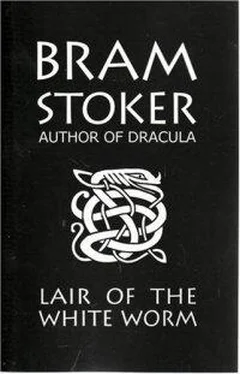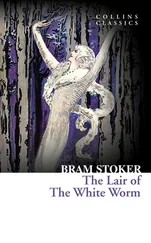Брэм Стокер - The Lair of the White Worm
Здесь есть возможность читать онлайн «Брэм Стокер - The Lair of the White Worm» весь текст электронной книги совершенно бесплатно (целиком полную версию без сокращений). В некоторых случаях можно слушать аудио, скачать через торрент в формате fb2 и присутствует краткое содержание. Жанр: Ужасы и Мистика, на английском языке. Описание произведения, (предисловие) а так же отзывы посетителей доступны на портале библиотеки ЛибКат.
- Название:The Lair of the White Worm
- Автор:
- Жанр:
- Год:неизвестен
- ISBN:нет данных
- Рейтинг книги:5 / 5. Голосов: 1
-
Избранное:Добавить в избранное
- Отзывы:
-
Ваша оценка:
- 100
- 1
- 2
- 3
- 4
- 5
The Lair of the White Worm: краткое содержание, описание и аннотация
Предлагаем к чтению аннотацию, описание, краткое содержание или предисловие (зависит от того, что написал сам автор книги «The Lair of the White Worm»). Если вы не нашли необходимую информацию о книге — напишите в комментариях, мы постараемся отыскать её.
The Lair of the White Worm — читать онлайн бесплатно полную книгу (весь текст) целиком
Ниже представлен текст книги, разбитый по страницам. Система сохранения места последней прочитанной страницы, позволяет с удобством читать онлайн бесплатно книгу «The Lair of the White Worm», без необходимости каждый раз заново искать на чём Вы остановились. Поставьте закладку, и сможете в любой момент перейти на страницу, на которой закончили чтение.
Интервал:
Закладка:
As Lady Arabella walked home with Adam from Castra Regis, she asked him if she might make a request. Permission having been accorded, she explained that before she finally left Diana’s Grove, where she had lived so long, she had a desire to know the depth of the well–hole. Adam was really happy to meet her wishes, not from any sentiment, but because he wished to give some valid and ostensible reason for examining the passage of the Worm, which would obviate any suspicion resulting from his being on the premises. He brought from London a Kelvin sounding apparatus, with a sufficient length of piano–wire for testing any probable depth. The wire passed easily over the running wheel, and when this was once fixed over the hole, he was satisfied to wait till the most advantageous time for his final experiment.
In the meantime, affairs had been going quietly at Mercy Farm. Lilla, of course, felt lonely in the absence of her cousin, but the even tenor of life went on for her as for others. After the first shock of parting was over, things went back to their accustomed routine. In one respect, however, there was a marked difference. So long as home conditions had remained unchanged, Lilla was content to put ambition far from her, and to settle down to the life which had been hers as long as she could remember. But Mimi’s marriage set her thinking; naturally, she came to the conclusion that she too might have a mate. There was not for her much choice—there was little movement in the matrimonial direction at the farmhouse. She did not approve of the personality of Edgar Caswall, and his struggle with Mimi had frightened her; but he was unmistakably an excellent parti , much better than she could have any right to expect. This weighs much with a woman, and more particularly one of her class. So, on the whole, she was content to let things take their course, and to abide by the issue.
As time went on, she had reason to believe that things did not point to happiness. She could not shut her eyes to certain disturbing facts, amongst which were the existence of Lady Arabella and her growing intimacy with Edgar Caswall; as well as his own cold and haughty nature, so little in accord with the ardour which is the foundation of a young maid’s dreams of happiness. How things would, of necessity, alter if she were to marry, she was afraid to think. All told, the prospect was not happy for her, and she had a secret longing that something might occur to upset the order of things as at present arranged.
When Lilla received a note from Edgar Caswall asking if he might come to tea on the following afternoon, her heart sank within her. If it was only for her father’s sake, she must not refuse him or show any disinclination which he might construe into incivility. She missed Mimi more than she could say or even dared to think. Hitherto, she had always looked to her cousin for sympathy, for understanding, for loyal support. Now she and all these things, and a thousand others—gentle, assuring, supporting—were gone. And instead there was a horrible aching void.
For the whole afternoon and evening, and for the following forenoon, poor Lilla’s loneliness grew to be a positive agony. For the first time she began to realise the sense of her loss, as though all the previous suffering had been merely a preparation. Everything she looked at, everything she remembered or thought of, became laden with poignant memory. Then on the top of all was a new sense of dread. The reaction from the sense of security, which had surrounded her all her life, to a never–quieted apprehension, was at times almost more than she could bear. It so filled her with fear that she had a haunting feeling that she would as soon die as live. However, whatever might be her own feelings, duty had to be done, and as she had been brought up to consider duty first, she braced herself to go through, to the very best of her ability, what was before her.
Still, the severe and prolonged struggle for self–control told upon Lilla. She looked, as she felt, ill and weak. She was really in a nerveless and prostrate condition, with black circles round her eyes, pale even to her lips, and with an instinctive trembling which she was quite unable to repress. It was for her a sad mischance that Mimi was away, for her love would have seen through all obscuring causes, and have brought to light the girl’s unhappy condition of health. Lilla was utterly unable to do anything to escape from the ordeal before her; but her cousin, with the experience of her former struggles with Mr. Caswall and of the condition in which these left her, would have taken steps—even peremptory ones, if necessary—to prevent a repetition.
Edgar arrived punctually to the time appointed by herself. When Lilla, through the great window, saw him approaching the house, her condition of nervous upset was pitiable. She braced herself up, however, and managed to get through the interview in its preliminary stages without any perceptible change in her normal appearance and bearing. It had been to her an added terror that the black shadow of Oolanga, whom she dreaded, would follow hard on his master. A load was lifted from her mind when he did not make his usual stealthy approach. She had also feared, though in lesser degree, lest Lady Arabella should be present to make trouble for her as before.
With a woman’s natural forethought in a difficult position, she had provided the furnishing of the tea–table as a subtle indication of the social difference between her and her guest. She had chosen the implements of service, as well as all the provender set forth, of the humblest kind. Instead of arranging the silver teapot and china cups, she had set out an earthen teapot, such as was in common use in the farm kitchen. The same idea was carried out in the cups and saucers of thick homely delft, and in the cream–jug of similar kind. The bread was of simple whole–meal, home–baked. The butter was good, since she had made it herself, while the preserves and honey came from her own garden. Her face beamed with satisfaction when the guest eyed the appointments with a supercilious glance. It was a shock to the poor girl herself, for she enjoyed offering to a guest the little hospitalities possible to her; but that had to be sacrificed with other pleasures.
Caswall’s face was more set and iron–clad than ever—his piercing eyes seemed from the very beginning to look her through and through. Her heart quailed when she thought of what would follow—of what would be the end, when this was only the beginning. As some protection, though it could be only of a sentimental kind, she brought from her own room the photographs of Mimi, of her grandfather, and of Adam Salton, whom by now she had grown to look on with reliance, as a brother whom she could trust. She kept the pictures near her heart, to which her hand naturally strayed when her feelings of constraint, distrust, or fear became so poignant as to interfere with the calm which she felt was necessary to help her through her ordeal.
At first Edgar Caswall was courteous and polite, even thoughtful; but after a little while, when he found her resistance to his domination grow, he abandoned all forms of self–control and appeared in the same dominance as he had previously shown. She was prepared, however, for this, both by her former experience and the natural fighting instinct within her. By this means, as the minutes went on, both developed the power and preserved the equality in which they had begun.
Without warning, the psychic battle between the two individualities began afresh. This time both the positive and negative causes were all in favour of the man. The woman was alone and in bad spirits, unsupported; nothing at all was in her favour except the memory of the two victorious contests; whereas the man, though unaided, as before, by either Lady Arabella or Oolanga, was in full strength, well rested, and in flourishing circumstances. It was not, therefore, to be wondered at that his native dominance of character had full opportunity of asserting itself. He began his preliminary stare with a conscious sense of power, and, as it appeared to have immediate effect on the girl, he felt an ever–growing conviction of ultimate victory.
Читать дальшеИнтервал:
Закладка:
Похожие книги на «The Lair of the White Worm»
Представляем Вашему вниманию похожие книги на «The Lair of the White Worm» списком для выбора. Мы отобрали схожую по названию и смыслу литературу в надежде предоставить читателям больше вариантов отыскать новые, интересные, ещё непрочитанные произведения.
Обсуждение, отзывы о книге «The Lair of the White Worm» и просто собственные мнения читателей. Оставьте ваши комментарии, напишите, что Вы думаете о произведении, его смысле или главных героях. Укажите что конкретно понравилось, а что нет, и почему Вы так считаете.












